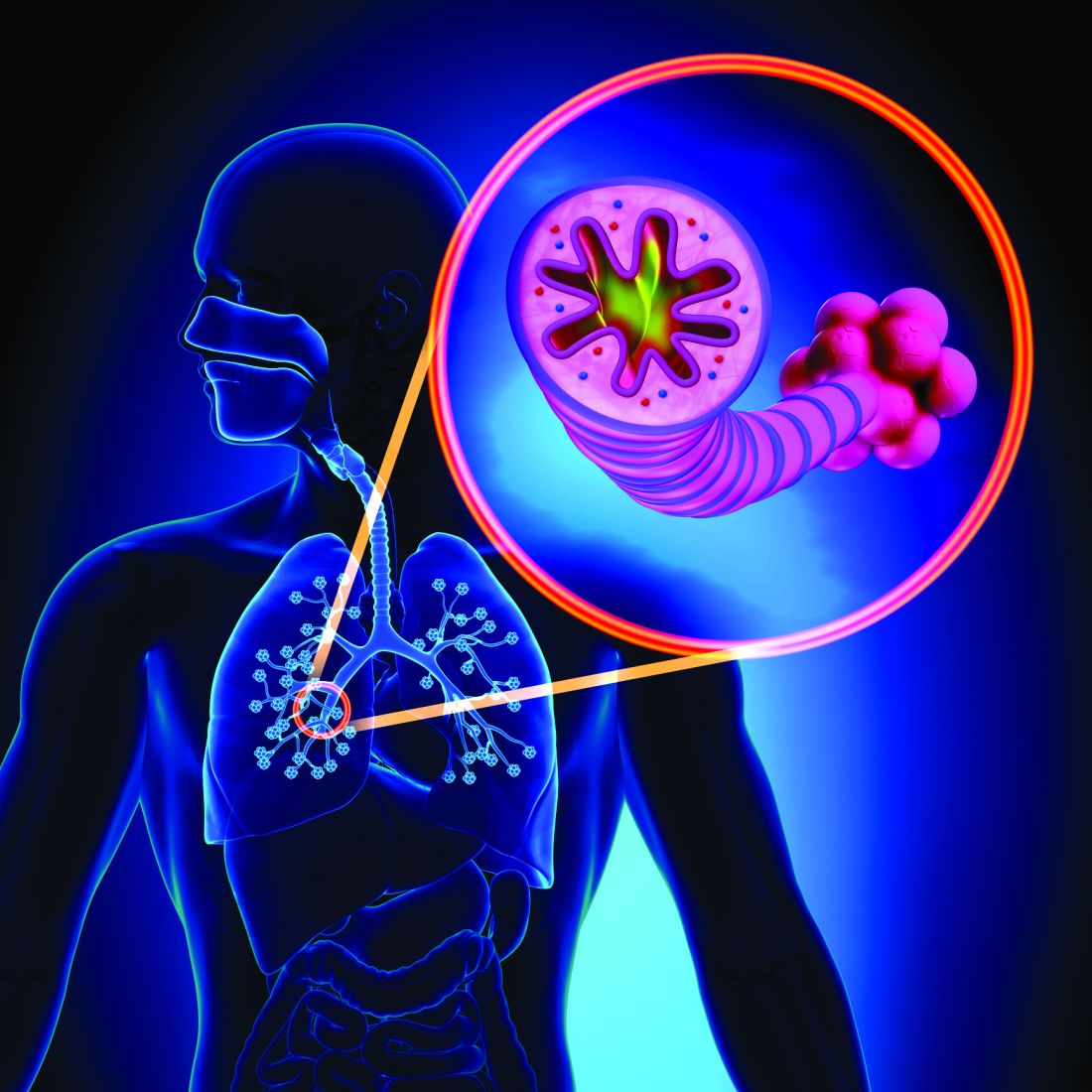User login
A new study has found that beta-blocker treatment did not prevent exacerbations in patients with moderate or severe chronic obstructive pulmonary disease (COPD).
“These results differ from previously reported findings from observational studies suggesting that beta-blockers reduce the risks of exacerbation and death from any cause in patients with COPD,” wrote Mark T. Dransfield, MD, of the University of Alabama at Birmingham and coauthors. Their findings were presented at the annual meeting of the American College of Chest Physicians and also were published simultaneously in the New England Journal of Medicine.
To determine the value of beta-blockers as a potential treatment for COPD, the researchers launched a prospective randomized trial called BLOCK COPD, consisting of 532 patients with moderate or severe COPD. They were assigned to two groups: those receiving extended-release metoprolol (n = 268) and those receiving placebo (n = 264). The mean age of all patients was 65 years.
The groups saw no significant difference in median time until the first exacerbation, which was 202 days (95% confidence interval, 162-282) in the metoprolol group and 222 days (95% CI, 189-295) in the placebo group (hazard ratio, 1.05; 95% CI, 0.84-1.32; P = .66). Metoprolol was associated with a higher risk of severe or very severe exacerbations leading to hospitalization (HR, 1.91; 95% CI, 1.29-2.83). During treatment, there were 11 deaths in the metoprolol group and 5 deaths in the placebo group.
Though there was no evidence of increases in patient-reported adverse events related to metoprolol, more discontinuations did occur in the metoprolol group compared with placebo (11.2% vs. 6.1%).
The authors acknowledged their study’s limitations, chiefly including the fact that the trial was ended early “on the basis of the conditional power analyses and concern about safety.” In addition, the reduction of heart rate and blood pressure in the metoprolol group made it impossible to fully blind the study. Finally, many patients in the trial had already suffered the effects of moderate to severe COPD, including previous hospitalization and the need for supplemental oxygen, leading to uncertainty as to “whether our results would apply to patients with mild airflow obstruction or a lower exacerbation risk.”
The study was supported by a grant from the Department of Defense. The authors reported numerous potential conflicts of interest, including receiving grants, personal fees and research funds from various pharmaceutical companies and government entities.
SOURCE: Dransfield MT et al. CHEST 2019. 2019 Oct 20. doi: 10.1056/NEJMoa1908142.
A new study has found that beta-blocker treatment did not prevent exacerbations in patients with moderate or severe chronic obstructive pulmonary disease (COPD).
“These results differ from previously reported findings from observational studies suggesting that beta-blockers reduce the risks of exacerbation and death from any cause in patients with COPD,” wrote Mark T. Dransfield, MD, of the University of Alabama at Birmingham and coauthors. Their findings were presented at the annual meeting of the American College of Chest Physicians and also were published simultaneously in the New England Journal of Medicine.
To determine the value of beta-blockers as a potential treatment for COPD, the researchers launched a prospective randomized trial called BLOCK COPD, consisting of 532 patients with moderate or severe COPD. They were assigned to two groups: those receiving extended-release metoprolol (n = 268) and those receiving placebo (n = 264). The mean age of all patients was 65 years.
The groups saw no significant difference in median time until the first exacerbation, which was 202 days (95% confidence interval, 162-282) in the metoprolol group and 222 days (95% CI, 189-295) in the placebo group (hazard ratio, 1.05; 95% CI, 0.84-1.32; P = .66). Metoprolol was associated with a higher risk of severe or very severe exacerbations leading to hospitalization (HR, 1.91; 95% CI, 1.29-2.83). During treatment, there were 11 deaths in the metoprolol group and 5 deaths in the placebo group.
Though there was no evidence of increases in patient-reported adverse events related to metoprolol, more discontinuations did occur in the metoprolol group compared with placebo (11.2% vs. 6.1%).
The authors acknowledged their study’s limitations, chiefly including the fact that the trial was ended early “on the basis of the conditional power analyses and concern about safety.” In addition, the reduction of heart rate and blood pressure in the metoprolol group made it impossible to fully blind the study. Finally, many patients in the trial had already suffered the effects of moderate to severe COPD, including previous hospitalization and the need for supplemental oxygen, leading to uncertainty as to “whether our results would apply to patients with mild airflow obstruction or a lower exacerbation risk.”
The study was supported by a grant from the Department of Defense. The authors reported numerous potential conflicts of interest, including receiving grants, personal fees and research funds from various pharmaceutical companies and government entities.
SOURCE: Dransfield MT et al. CHEST 2019. 2019 Oct 20. doi: 10.1056/NEJMoa1908142.
A new study has found that beta-blocker treatment did not prevent exacerbations in patients with moderate or severe chronic obstructive pulmonary disease (COPD).
“These results differ from previously reported findings from observational studies suggesting that beta-blockers reduce the risks of exacerbation and death from any cause in patients with COPD,” wrote Mark T. Dransfield, MD, of the University of Alabama at Birmingham and coauthors. Their findings were presented at the annual meeting of the American College of Chest Physicians and also were published simultaneously in the New England Journal of Medicine.
To determine the value of beta-blockers as a potential treatment for COPD, the researchers launched a prospective randomized trial called BLOCK COPD, consisting of 532 patients with moderate or severe COPD. They were assigned to two groups: those receiving extended-release metoprolol (n = 268) and those receiving placebo (n = 264). The mean age of all patients was 65 years.
The groups saw no significant difference in median time until the first exacerbation, which was 202 days (95% confidence interval, 162-282) in the metoprolol group and 222 days (95% CI, 189-295) in the placebo group (hazard ratio, 1.05; 95% CI, 0.84-1.32; P = .66). Metoprolol was associated with a higher risk of severe or very severe exacerbations leading to hospitalization (HR, 1.91; 95% CI, 1.29-2.83). During treatment, there were 11 deaths in the metoprolol group and 5 deaths in the placebo group.
Though there was no evidence of increases in patient-reported adverse events related to metoprolol, more discontinuations did occur in the metoprolol group compared with placebo (11.2% vs. 6.1%).
The authors acknowledged their study’s limitations, chiefly including the fact that the trial was ended early “on the basis of the conditional power analyses and concern about safety.” In addition, the reduction of heart rate and blood pressure in the metoprolol group made it impossible to fully blind the study. Finally, many patients in the trial had already suffered the effects of moderate to severe COPD, including previous hospitalization and the need for supplemental oxygen, leading to uncertainty as to “whether our results would apply to patients with mild airflow obstruction or a lower exacerbation risk.”
The study was supported by a grant from the Department of Defense. The authors reported numerous potential conflicts of interest, including receiving grants, personal fees and research funds from various pharmaceutical companies and government entities.
SOURCE: Dransfield MT et al. CHEST 2019. 2019 Oct 20. doi: 10.1056/NEJMoa1908142.
FROM CHEST 2019

